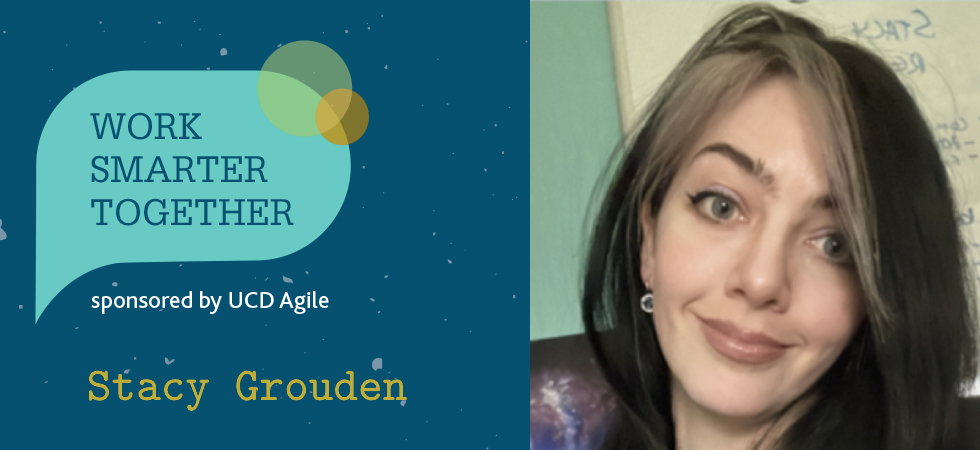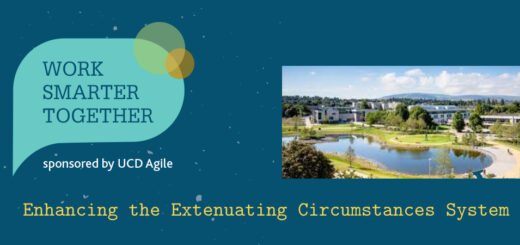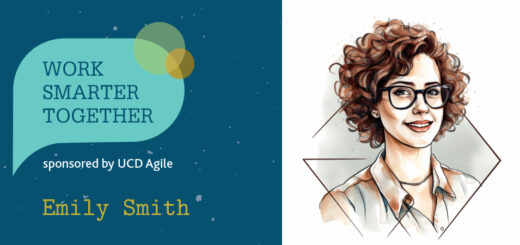‘A Day in the Life’ with Stacy Grouden
 Who are you?
Who are you?
My name is Stacy Grouden and I’m the School Manager in the School of English Drama and Film.
How did you get here? What was the journey to UCD?
I arrived as a student in 2012 and never left! I’ve worked in a few different departments around UCD – school offices, research and innovation, UCD Registry and have even been a tutor in Film Studies, a subject I studied to MA level – but have spent six-ish years, give or take a secondment, in the School of English Drama and Film, where I became the School Manager in March 2022.
What is your role within UCD, and what are your main responsibilities?
The College of Arts and Humanities is divided into seven schools, and I manage one of them, which is itself divided into four subject areas/departments – English, Drama, Film and Creative Writing. I oversee a team of admin staff who look after undergraduate English, Drama and Film, graduate studies and research administration. I also have subject-level responsibilities for English and Creative Writing. This means I work with the subject heads in those areas on building the timetable and major structures for those subjects, and setting up and paying occasional lecturers and tutors. I work with my colleagues to keep the department informed about the academic calendar, assessment and the GAP, using the curriculum management system, T&L procedures around new modules, as well as various events, conferences and research seminars organised by our faculty. I also address queries from students around their registration, degree compliance, programme options, assignments and the labyrinthine layout of the Newman building. (‘Yes, the C corridor leads straight into the J corridor…yes I know that’s weird…’)
Could you briefly describe what a typical day looks like for you?
Generally I’ll check in with my team in the morning. One or more of them may want advice on a query or to work together on something – maybe like a timetable or google form, and it often helps to have a second pair of eyes or a ‘buddy’ to demo something for. It really depends on the time of year what I’m doing, and whether it’s more staff- or student-facing. Lately, my work has been heavily related to planning for next year – we’re assigning people to teach 200+ tutorials and workshops for the school next year, and also moving things around due to faculty on research leave, so there’s a bit of back-and-forth about availability. The programme office might be in touch about final year students’ degree compliance if their credits look a bit unbalanced, which I’ll discuss with T&L. If I get notice of a school event, I’ll circulate it to staff and post about it on the school social media pages, usually Instagram: ‘ucdschoolofenglishdramafilm’ ! We’re also organising exam boards, and ensuring material is available for review by our external examiners. Things always come up on-campus too: we’re booking RSPs locally; ordering computers or furniture; and of course, directing lost souls around the Newman building. (‘So to get to FG from here, you must first go to AD… yes I know that’s weird…’)
What are some of the most interesting or challenging tasks you encounter on a regular basis? Why are they unavoidable?
The size and scale of the school and the way it is positioned on both the BA Arts and BA Humanities makes for some logistical challenges in terms of scheduling our teaching to avoid clashes with other subjects; as well as finding time and space to fit everything in. Our school is the largest in the College of Arts and Humanities, and English can be taken as a joint major subject with any other subject in the BA Arts, and some on the BSocSci. We also ‘own’ a number of single-major pathways on the BA Humanities. So we have a very diverse cohort of students with some very interesting single- and joint-major subject combinations, and ensuring as few clashes and as much optionality as possible can be challenging.
Are there any specific projects or initiatives you or your unit are currently working on that you would like to share?
I’d encourage people to look at some of the outputs from the Creative Futures Academy (CFA) a cross-institutional initiative with IADT and NCAD spearheaded at UCD by Prof. PJ Mathews from our school with a focus on creative practice and industry. The old DramSoc theatre in Newman is currently being renovated to support this work and I think we’re going to see some wonderful work emerging from it.
Is there a process or element of your work that you would improve or change?
I’ve noticed more split-stage registrations cropping up in the BA Arts, where a student might not meet the progression requirements in one of their two joint major subject areas, so may be in Stage 1 of one subject and Stage 2 in another, which does complicate their registration and progression. It’s a tricky thing to track but it would be great to be able to ‘fix’ their registration earlier than when the rest of the cohort is registering. On a similar note, I’d love to develop a fair and reliable way to discern which modules incoming students, at Stages 3 and 4 in particular, are interested in taking in the coming year to aid us with planning. (Watch this space?)
Could you share a memorable experience you’ve had while working in your role?
The school had a fantastic symposium when our Professor of Creative Writing, Frank McGuinness, retired in 2019, which incorporated academic panels, interviews, music, and performances of his work by the Ad Astra scholars. It was a wonderful tribute to a great colleague. This role has also given me so many opportunities to attend lectures, readings, performances by great guest speakers – I fondly remember Paula Meehan’s incredible lectures here as Ireland Professor of Poetry, as well as how kind Paula was herself.
Is there a particular skill or expertise that helps you in your role and what advice would you give to someone joining your unit?
I’ve been at UCD as a student, a teacher, and as an administrator – or as I like to say, I have had all three colours of UCard – and I think that’s been really useful in informing my perspective and ability to put myself in the shoes of everyone engaging with my department. I also think that gradually building relationships and institutional knowledge around UCD, and within my school, was invaluable. I could not have coped with being school manager here without already knowing something about our programmes and personnel! So that would be my advice – work your way up a little at a time, get to know your colleagues in other departments, and give them the patience and grace you would want extended to you.
How do you collaborate with other teams or colleagues in your day-to-day work?
Google Spaces is great for this – our team rotas in and out of campus so we have a Google Space and a Google Drive that we use to save and communicate information, and to reach team members reasonably quickly when they are not on campus. I’m also in one for school managers, and for the RWG (remote working group) – which I find to be a wonderfully collaborative initiative and valuable source of information. That said, there’s a lot to be said for popping into a colleague for a chat when you’re both on campus as well, and I value hybrid working for the ability to juggle both styles of working.
Are there any common misconceptions about your role?
School managers are not tech support, and we’re not ‘secretaries’ – a word I was mildly horrified to see a colleague use in an email to describe a school administrator! We’ve come a long way from taking dictation and making coffee for the boss, and are often involved in complex decision-making at school level, as well as working groups around UCD, where the school perspective is valued (and valuable) in informing how we continue to improve the university experience for staff and students alike.
How do you see your job changing over the next ten or twenty years?
It’s hard to predict the future, especially when COVID escalated a lot of changes that we maybe expected to happen more gradually in terms of online assessment, lecture capture, and using more online forms/connectors to manage queries. I think the subject areas within our school will continue to grow, especially with Drama and Film coming on-stream as Leaving Cert subjects. Some of those subject areas will evolve too – initiatives like the CFA may mean more practical work in those areas which will necessitate new partnerships and collaborations. I’d like to see my role as school manager become more strategic and collaborative across units and institutions to give our students the best possible experience, and to have more support for some of the great ideas our faculty have for growing the four departments here, like with the CFA. Again, some of those changes above will help to make these improvements possible.
What is an achievement big or small you’ve had while in this role?
Becoming School Manager was a big deal for me! I did some hourly work before I was hired here as an EA in 2015, was regraded to SEA in 2020, and successfully applied to be school manager in 2022. To go from the newbie at the photocopier to the head of the admin team has felt like a natural progression but still a huge achievement, change, and new level of responsibility. I feel very lucky that I’ve been able to do that within a school that I already know so well, and where I genuinely like my job and colleagues.
If your job had a theme song or soundtrack, what would it be [and why]?
‘Show You the Way’ by Thundercat, given how often my job comes down to showing people the way through their degrees; through the GAP; and of course, through the Newman building.



